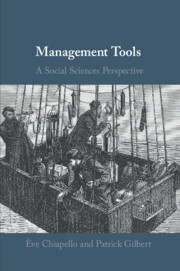Book contents
- Management Tools
- Management Tools
- Copyright page
- Contents
- Figures
- Tables
- Acknowledgements
- How to Use This Book
- Introduction
- Part I Theoretical Foundations for Thinking about Management Instrumentation
- Part II Three Major Types of Social Science Approaches
- 3 Critical Perspectives on Management Tools
- 4 Institutionalist Perspectives on Management Tools
- 5 Interactional Perspectives on Management Tools
- Part III Synthesis
- General Conclusion
- Book part
- Bibliography
- Index
5 - Interactional Perspectives on Management Tools
from Part II - Three Major Types of Social Science Approaches
Published online by Cambridge University Press: 31 July 2019
- Management Tools
- Management Tools
- Copyright page
- Contents
- Figures
- Tables
- Acknowledgements
- How to Use This Book
- Introduction
- Part I Theoretical Foundations for Thinking about Management Instrumentation
- Part II Three Major Types of Social Science Approaches
- 3 Critical Perspectives on Management Tools
- 4 Institutionalist Perspectives on Management Tools
- 5 Interactional Perspectives on Management Tools
- Part III Synthesis
- General Conclusion
- Book part
- Bibliography
- Index
Summary
The notions of actor (although not all the theories discussed here use this exact term) and interaction are central for the authors of the theories reviewed in this chapter. It is not the properties of the humans that are prominent in these works but the interpersonal positioning that guides their relations, the way in which they interact in complex surroundings (network, action system, activity system, sign system, etc.) and the social dynamics that result. The four theses examined here are alike in many ways. Unlike critical approaches and certain institutionalist approaches their analysis does not include the effects of social superstructures. In these cases there are no external determinants, no overarching social influence. The accent is on the autonomy of the actors who have the means (construction of meaning, power to act, strategic capacity) that grant them the free space they exploit.
Information
- Type
- Chapter
- Information
- Management ToolsA Social Sciences Perspective, pp. 153 - 198Publisher: Cambridge University PressPrint publication year: 2019
